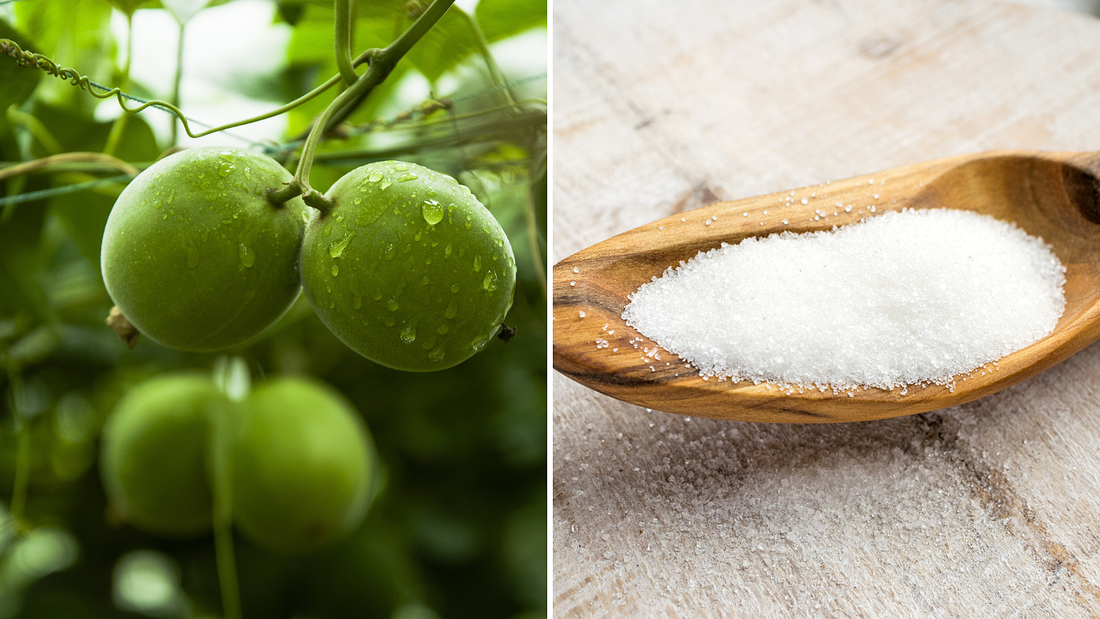At GURU, we believe that what you put in your body matters. That's why we only use natural sweeteners like stevia and monk fruit to reduce sugar and calories in our drinks while keeping the smooth, deliciously sweet taste we all love. We know it can be confusing to understand the differences between all the types of sweeteners out there. So, we’ve made it simple for you with this article!
What Are Artificial Sweeteners?
Artificial sweeteners like aspartame and sucralose are chemically created and have been linked to potential health risks. Aspartame has been associated with an increased risk of certain cancers, such as lymphoma and leukemia, as well as neurological disorders like Alzheimer's disease and multiple sclerosis. Some individuals may also experience symptoms such as headaches and mood disorders after consuming aspartame. Sucralose, while generally considered safe, has been found to alter the balance of bacteria in the gut and may be associated with an increased risk of certain cancers.
The Benefits of Natural Sweeteners
Unlike artificial sweeteners, natural sweeteners like stevia and monk fruit are derived from plants and have been used for centuries as sweeteners in traditional medicine. These sweeteners are low in calories, have a low glycemic index, and don't have the negative side effects that come with artifical sweeteners. They also offer potential health benefits such as anti-inflammatory properties, improved blood sugar levels, and reduced risk of certain diseases.
Why We Choose Natural Sweeteners
GURU is committed to using only the highest quality ingredients in our products. That's why our energy drinks have 0 sucralose and 0 aspartame in them. Instead, we choose to use natural sweeteners like stevia and monk fruit. We believe that our customers deserve drinks that not only taste great, but are also good for them. By using natural sweeteners, we can provide a delicious, sweet, refreshing energy drink without any excess sugar or calories.
Cheers to good vibes and good health!
References:
Abegunde, A. T., Mathews, T. A., & Byun, H. G. (2018). Alzheimer's Disease and Aspartame: A Possible Connection. NeuroMolecular Medicine, 20(2), 247-255. doi: 10.1007/s12017-018-8482-y
Bian, X., Tu, P., Chi, L., Gao, B., Ru, H., & Lu, K. (2017). Saccharin induced liver inflammation in mice by altering the gut microbiota and its metabolic functions. Food and Chemical Toxicology, 107(Pt A), 530-539. doi: 10.1016/j.fct.2017.06.009
Gao, L., Lu, Y., Li, J., Shan, N., & Fan, H. (2021). Antioxidant, anti-inflammatory, and anti-tumor activities of monk fruit (Siraitia grosvenorii) extracts: A systematic review. Journal of Ethnopharmacology, 266, 113420. doi: 10.1016/j.jep.2020.113420
International Food Information Council Foundation. (2021). Low- and No-Calorie Sweeteners. Retrieved from https://foodinsight.org/low-calorie-sweeteners/.
Li, H. L., Sui, F., Li, L., Li, Y., & Wei, W. (2021). A systematic review on the safety of steviol glycosides intake in human population. Food and Chemical Toxicology, 147, 111884. doi: 10.1016/j.fct.2020.111884
O'Connell, J. E., Fox, A. M., Clancy, R. L., & Kelleher, C. T. (2018). The sweet side of dietary supplementation: Using natural sweeteners as a way to reduce sugar intake. Journal of Nutrition Education and Behavior, 50(3), 270-276. doi: 10.1016/j.jneb.2017.10.004
Pan, Y., Guo, Y., Qi, X., & Chen, L. (2019). The impact of artificial sweeteners on gut microbiota in models of type 2 diabetes mellitus. Acta Pharmaceutica Sinica B, 9(4), 701-710. doi: 10.1016/j.apsb.2019.02.001
Soffritti, M., Belpoggi, F., Degli Esposti, D., Lambertini, L., Tibaldi, E., & Rigano, A. (2010). First experimental demonstration of the multipotential carcinogenic effects of aspartame administered in the feed to Sprague-Dawley rats. Environmental Health Perspectives, 118(3), 379-385. doi: 10.1289/ehp.0901166
Trocho, C., Pardo, R., Rafecas, I., Virgili, J., & Remesar, X. (1998). Formaldehyde derived from dietary aspartame binds to tissue components in vivo. Life Sciences, 63(5), 337-349. doi: 10.1016/s0024-3205(98)00228-0
Ulbricht, C., Isaac, R., Milkin, T., Poole, E. A., Rusie, E., Grimes Serrano, J. M., ... & Windsor, R. C. (2016). An evidence-based systematic review of stevia by the natural standard research collaboration. Cardiovascular and Hematological Agents in Medicinal Chemistry, 14(1), 28-37. doi: 10.2174/1871525714666160304114220
Zhang, Y., & Yin, J. (2019). Impact of natural sweeteners on obesity: A systematic review. Journal of the American College of Nutrition, 38(8), 737-746. doi: 10.1080/07315724.2019.1595155

